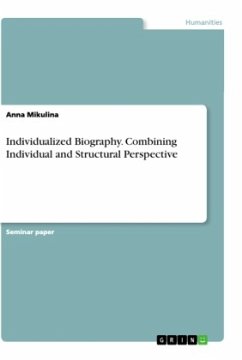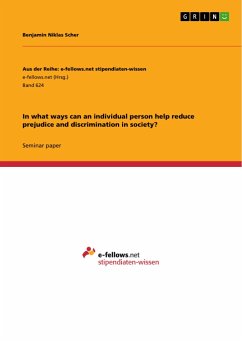
Individualized Biography. Combining Individual and Structural Perspective

PAYBACK Punkte
0 °P sammeln!
Seminar paper from the year 2020 in the subject Sociology - Individual, Groups, Society, grade: 1.7, University of Frankfurt (Main), language: English, abstract: Understanding factors, mechanisms and processes of upward and downward mobility in different countries remains an important scientific task of sociology around the world. The dominant approach to social inequality analysis is the structural approach, which places mobility in the context of social structures' ability to reproduce or overcome unequal opportunities. Yet, despite prejudice to social mobility in scientific discourse, the r...
Seminar paper from the year 2020 in the subject Sociology - Individual, Groups, Society, grade: 1.7, University of Frankfurt (Main), language: English, abstract: Understanding factors, mechanisms and processes of upward and downward mobility in different countries remains an important scientific task of sociology around the world. The dominant approach to social inequality analysis is the structural approach, which places mobility in the context of social structures' ability to reproduce or overcome unequal opportunities. Yet, despite prejudice to social mobility in scientific discourse, the reality of modern society emphasizes the role of personal decisions and individual turning points. The theory of individualization, which addresses individual and structural factors together while not contradicting them, has received a great resonance. According to this theory, the importance of structural factors and universal stratification characteristics that determine human life is increasingly weakening in the individual's biography. Stable economic growth, the advancement of the education and social security system, instability in labor markets and increased flows of transnational migration have weakened class boundaries and increased the diversity of life opportunities and transitions, as well as the role of individual in the creation of own biography and the importance of personal choices, forcing a reconsideration of approaches and methods in studies of social mobility. The integration of the individual into social mobility research is an important methodological task, which solution is closely linked to the development of a life-course approach to mobility. This approach can be broadly defined as consolidating research on biographies and life-stories of individuals, families, and generations using both quantitative and qualitative methods. In the biographical approach, a person's life is understood as a result of the reciprocal effects of structural forces and individual actions and can be defined as a series of milestones in life-events defined by the social order, at each one of which an individual chooses certain social roles and statuses. Biographical choices depend also on individual habitus - stable patterns of thinking, perception, and evaluation embedded in the body. However, the ideologically ambiguous concept of individualization suggests the disintegration of previously existing social forms and the increasing fragility of traditionally important parameters of industrial society such as class culture and self-consciousness, race and ethnicity, gender roles and family.













